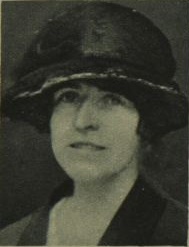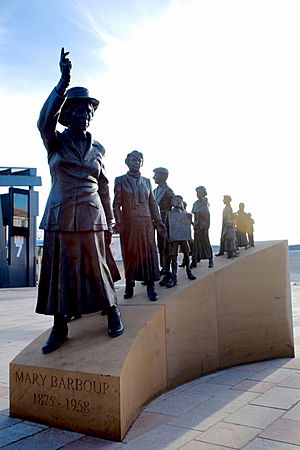Agnes Dollan facts for kids
Quick facts for kids
Lady
Agnes Dollan
MBE
|
|
|---|---|

Dollan in 1924
|
|
| Born |
Agnes Johnston Moir
16 August 1887 |
| Died | 16 July 1966 (aged 78) Glasgow Victoria Infirmary, Glasgow, Scotland
|
| Nationality | British |
| Political party | Independent Labour Party, Labour Party, Scottish Socialist Party |
| Spouse(s) | Patrick Dollan |
| Children | 1 |
| Parent(s) | Anne (née Wilkinson) and Henry Moir |
| Awards | Member of the Order of the British Empire (awarded 1946) |
Agnes Johnston Dollan MBE (born Agnes Moir; 16 August 1887 – 16 July 1966) was a Scottish woman who fought for women's right to vote. She was also a very active person in politics. People sometimes called her Agnes, Lady Dollan.
Agnes Dollan was a main leader during the Glasgow Rent Strikes. This was a time when people protested against landlords raising rents. She also helped start the Women's Peace Crusade. This group wanted peace during wartime. In 1919, she became the first woman chosen by the Labour Party to run for election to the Glasgow Town Council. Later, she became Lady Provost of Glasgow, a very important role in the city.
Early Life
Agnes Dollan was born in Springburn, Glasgow, Scotland on 16 August 1887. Her parents were Anne Wilkinson and Henry Moir. Henry worked as a blacksmith in a factory that made parts for trains. Agnes was one of eleven children in her family.
She went to school in her local area until she was eleven years old. She had to leave school because her family was very poor. Agnes also went to special Socialist Sunday Schools. Here, she learned about fairness and equality for everyone. She said she "graduated as a Socialist" from these schools.
After leaving school, Agnes first worked in a factory. Later, she became a telephone operator for the General Post Office. While working there, she joined the Women's Labour League. She also helped Mary Reid Macarthur create a trade union for women working in the post office. A trade union is a group that helps workers get fair pay and good working conditions.
When she was 18, Agnes joined the Independent Labour Party (ILP). She also joined the Women's Social and Political Union. This group actively fought for women's right to vote.
Agnes met Patrick Dollan, who was a journalist and also part of the Independent Labour Party. They met through a group called the Clarion Scouts. Agnes married Patrick on 20 September 1912. Their only child, James, was born in 1913. James Dollan later became a journalist too.
Rent Strikes and Peace Work
Agnes Dollan became very active in politics during a time known as Red Clydeside in Glasgow. This was a period of strong working-class movements. She helped organize the 1915 Glasgow Rent Strikes. She worked with other important women like Mary Barbour, Helen Crawfurd, Mary Burns Laird, and Mary Jeff.
Agnes worked hard to connect the rent strike movement with campaigns for peace. She was the Treasurer of the Glasgow Women's Housing Association. In this role, she led the fight against landlords who raised rents. In 1917, she was briefly put in jail for protesting against high rents. Agnes was also a member of The Women's Peace Crusade in Glasgow. This group worked to stop wars.
Agnes became a well-known person in Glasgow politics. She spoke at a big protest called the May Day demo in Glasgow Green in 1917. She was also a member of the Women's Social and Political Union and the Women's Labour League.
Political Career
Agnes Dollan joined the Independent Labour Party around 1915. In January 1919, she became the first woman from the Labour Party to run for election to the Glasgow City Council. On 13 December 1921, Agnes was elected as a councillor for Springburn in a special election. She successfully ran for Council again in 1922 and stayed in this role until 1928. In 1928, Agnes became a Justice of the Peace. This meant she could help with legal matters and keep the peace.
In 1924, Agnes wrote in The Sunday Post newspaper. She wrote about changing a law called the Representation of the People Act 1918. This law had given some women the right to vote, but not all. Agnes clearly explained that women's everyday interests were a good reason for all women to have the right to vote.
Agnes Dollan was the first Labour candidate to run in Dumfriesshire in the 1924 United Kingdom general election. However, she did not win that election.
She was part of the Labour Party National Executive from 1922 to 1928. She rejoined in the 1930s after being ill for a while. In 1933, she spoke at the National Conference of Labour Women. She argued that there should be more women candidates for the Labour Party.
I am convinced that our women are as good as the men, and better in some cases.
Agnes Dollan tried to stop the Independent Labour Party (ILP) from leaving the Labour Party. After the split, she became the first president of the Scottish Socialist Party's women's council in 1933. She also campaigned to be the Labour Party (UK) candidate for Leith in the 1935 United Kingdom general election. Her main points were the possibility of another war, a new law about unemployment, and "poverty in the midst of plenty." Another person, David Cleghorn Thomson, ended up running in that election.
Agnes's husband, Patrick, was the Lord Provost of Glasgow from 1938 to 1941. Even when she went to events with him, Agnes kept her own strong identity.
Anti-War Activism
Agnes Dollan, along with Helen Crawfurd and others, started two important peace groups. They created the Women's Peace Crusade in 1916. They also started the Glasgow branch of the Women's International League in 1915. Agnes worked with Agnes Harben and other women. Both Agnes Dollan and Helen Crawfurd were great speakers. They traveled around Scotland, sharing their message about peace.
Agnes strongly disagreed with the idea that wars were fought to protect the "honour of women."
With regard to the honour of women, as a woman, she objected to that being made an excuse for such a diabolical slaughter. She protested against her honour being made an excuse for war.
In 1918, Agnes spoke for the ILP about 'Russian intervention' at a meeting in Hamilton. In 1922, Agnes Dollan and Mary Barbour spoke in Langside. They talked about women's rights as citizens and how these rights related to world peace, stopping wars, and fairness between countries.
Later, Agnes changed her views on war because of World War II. She said that:
It was all very well to theorise under normal conditions but we were not living under such conditions today - we were facing a crisis which might mean general mobilisation.
This meant that while it was easy to talk about peace in normal times, the world was facing a huge crisis. Agnes later joined the Moral Re-Armament Movement, which aimed to solve world problems through moral and spiritual change.
Honours
Agnes Dollan was given an MBE award in George VI's Birthday Honours list in 1946. She received this award for her efforts during the war. She was the main organizer in Glasgow for the Women's Voluntary Services. This group helped people during the war.
Death
Agnes Dollan passed away from heart failure on 16 July 1966. She died in Glasgow's Victoria Infirmary.


